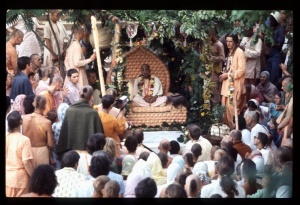CC Madhya 6.48: Difference between revisions
m (1 revision(s)) |
(Vanibot #0054 edit - transform synonyms into clickable links, which search similar occurrences) |
||
| (One intermediate revision by one other user not shown) | |||
| Line 1: | Line 1: | ||
{{ | [[Category:Sri Caitanya-caritamrta - Madhya-lila Chapter 06|C048]] | ||
<div style="float:left">'''[[Sri Caitanya-caritamrta|Śrī Caitanya-caritāmṛta]] - [[CC Madhya|Madhya-līlā]] - [[CC Madhya 6|Chapter 6: The Liberation of Sārvabhauma Bhaṭṭācārya]]'''</div> | |||
<div style="float:right">[[File:Go-previous.png|link=CC Madhya 6.47|Madhya-līlā 6.47]] '''[[CC Madhya 6.47|Madhya-līlā 6.47]] - [[CC Madhya 6.49|Madhya-līlā 6.49]]''' [[File:Go-next.png|link=CC Madhya 6.49|Madhya-līlā 6.49]]</div> | |||
{{CompareVersions|CC|Madhya 6.48|CC 1975|CC 1996}} | |||
{{RandomImage}} | |||
==== TEXT 48 ==== | ==== TEXT 48 ==== | ||
<div | <div class="verse"> | ||
‘namo nārāyaṇāya’ bali’ namaskāra kaila | :‘namo nārāyaṇāya’ bali’ namaskāra kaila | ||
‘kṛṣṇe matir astu’ bali’ gosāñi kahila | :‘kṛṣṇe matir astu’ bali’ gosāñi kahila | ||
</div> | </div> | ||
| Line 12: | Line 16: | ||
==== SYNONYMS ==== | ==== SYNONYMS ==== | ||
<div | <div class="synonyms"> | ||
namaḥ | ''[//vanipedia.org/wiki/Special:VaniSearch?s=namaḥ&tab=syno_o&ds=1 namaḥ] [//vanipedia.org/wiki/Special:VaniSearch?s=nārāyaṇāya&tab=syno_o&ds=1 nārāyaṇāya]'' — I offer my respects to Nārāyaṇa; ''[//vanipedia.org/wiki/Special:VaniSearch?s=bali’&tab=syno_o&ds=1 bali’]'' — saying; ''[//vanipedia.org/wiki/Special:VaniSearch?s=namaskāra&tab=syno_o&ds=1 namaskāra] [//vanipedia.org/wiki/Special:VaniSearch?s=kaila&tab=syno_o&ds=1 kaila]'' — offered respects to Lord Caitanya Mahāprabhu; ''[//vanipedia.org/wiki/Special:VaniSearch?s=kṛṣṇe&tab=syno_o&ds=1 kṛṣṇe]'' — unto Lord Kṛṣṇa; ''[//vanipedia.org/wiki/Special:VaniSearch?s=matiḥ&tab=syno_o&ds=1 matiḥ] [//vanipedia.org/wiki/Special:VaniSearch?s=astu&tab=syno_o&ds=1 astu]'' — let there be attraction; ''[//vanipedia.org/wiki/Special:VaniSearch?s=bali’&tab=syno_o&ds=1 bali’]'' — saying; ''[//vanipedia.org/wiki/Special:VaniSearch?s=gosāñi&tab=syno_o&ds=1 gosāñi]'' — Śrī Caitanya Mahāprabhu; ''[//vanipedia.org/wiki/Special:VaniSearch?s=kahila&tab=syno_o&ds=1 kahila]'' — spoke. | ||
</div> | </div> | ||
| Line 19: | Line 23: | ||
==== TRANSLATION ==== | ==== TRANSLATION ==== | ||
<div | <div class="translation"> | ||
Offering his obeisances to Caitanya Mahāprabhu, Sārvabhauma Bhaṭṭācārya said, “Namo nārāyaṇāya” [“I offer my obeisances to Nārāyaṇa”]. | Offering his obeisances to Caitanya Mahāprabhu, Sārvabhauma Bhaṭṭācārya said, “Namo nārāyaṇāya” [“I offer my obeisances to Nārāyaṇa”]. | ||
| Line 28: | Line 32: | ||
==== PURPORT ==== | ==== PURPORT ==== | ||
<div | <div class="purport"> | ||
It is the etiquette among sannyāsīs, those on the fourth platform of spiritual life, to offer respects by saying oṁ namo nārāyaṇāya (“I offer my respectful obeisances unto Nārāyaṇa”). This greeting is used especially by Māyāvādī sannyāsīs. According to the smṛti scriptures, a sannyāsī should not expect anything from anyone, nor should he consider himself identical with the Supreme Personality of Godhead. Vaiṣṇava sannyāsīs never think of themselves as being one with the Lord; they always consider themselves eternal servants of Kṛṣṇa, and they want to see everyone in the world become Kṛṣṇa conscious. For this reason, a Vaiṣṇava sannyāsī always offers his blessings to everyone, saying kṛṣṇe matir astu (“May you become Kṛṣṇa conscious”). | It is the etiquette among ''sannyāsīs'', those on the fourth platform of spiritual life, to offer respects by saying ''oṁ namo nārāyaṇāya'' (“I offer my respectful obeisances unto Nārāyaṇa”). This greeting is used especially by Māyāvādī ''sannyāsīs''. According to the ''smṛti'' scriptures, a ''sannyāsī'' should not expect anything from anyone, nor should he consider himself identical with the Supreme Personality of Godhead. Vaiṣṇava ''sannyāsīs'' never think of themselves as being one with the Lord; they always consider themselves eternal servants of Kṛṣṇa, and they want to see everyone in the world become Kṛṣṇa conscious. For this reason, a Vaiṣṇava ''sannyāsī'' always offers his blessings to everyone, saying ''kṛṣṇe matir astu'' (“May you become Kṛṣṇa conscious”). | ||
</div> | </div> | ||
__NOTOC__ | |||
<div style="float:right; clear:both;">[[File:Go-previous.png|link=CC Madhya 6.47|Madhya-līlā 6.47]] '''[[CC Madhya 6.47|Madhya-līlā 6.47]] - [[CC Madhya 6.49|Madhya-līlā 6.49]]''' [[File:Go-next.png|link=CC Madhya 6.49|Madhya-līlā 6.49]]</div> | |||
__NOTOC__ | |||
__NOEDITSECTION__ | |||
Latest revision as of 23:45, 19 February 2024

A.C. Bhaktivedanta Swami Prabhupada
TEXT 48
- ‘namo nārāyaṇāya’ bali’ namaskāra kaila
- ‘kṛṣṇe matir astu’ bali’ gosāñi kahila
SYNONYMS
namaḥ nārāyaṇāya — I offer my respects to Nārāyaṇa; bali’ — saying; namaskāra kaila — offered respects to Lord Caitanya Mahāprabhu; kṛṣṇe — unto Lord Kṛṣṇa; matiḥ astu — let there be attraction; bali’ — saying; gosāñi — Śrī Caitanya Mahāprabhu; kahila — spoke.
TRANSLATION
Offering his obeisances to Caitanya Mahāprabhu, Sārvabhauma Bhaṭṭācārya said, “Namo nārāyaṇāya” [“I offer my obeisances to Nārāyaṇa”].
In return, Caitanya Mahāprabhu said, “Kṛṣṇe matir astu” [“Let your attention be on Kṛṣṇa”].
PURPORT
It is the etiquette among sannyāsīs, those on the fourth platform of spiritual life, to offer respects by saying oṁ namo nārāyaṇāya (“I offer my respectful obeisances unto Nārāyaṇa”). This greeting is used especially by Māyāvādī sannyāsīs. According to the smṛti scriptures, a sannyāsī should not expect anything from anyone, nor should he consider himself identical with the Supreme Personality of Godhead. Vaiṣṇava sannyāsīs never think of themselves as being one with the Lord; they always consider themselves eternal servants of Kṛṣṇa, and they want to see everyone in the world become Kṛṣṇa conscious. For this reason, a Vaiṣṇava sannyāsī always offers his blessings to everyone, saying kṛṣṇe matir astu (“May you become Kṛṣṇa conscious”).